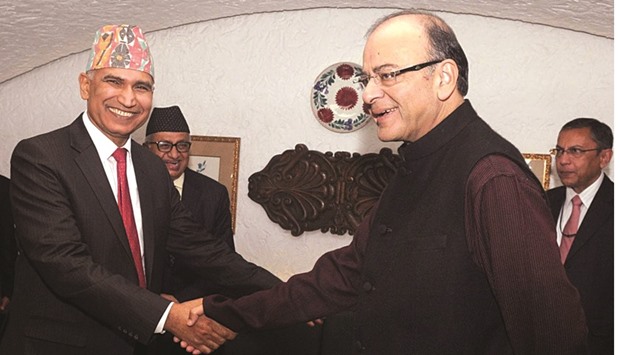Nepal’s ethnic minority groups lifted a four-month-old blockade along a major trading point with India yesterday, saying it didn’t want ordinary people to suffer anymore, but vowed to carry on with its campaign against the new constitution.
The Madhesi Front of four small parties based in the Tarai lowlands launched the strike in September to force Nepal’s major political parties to amend the new charter and give them a greater role in the power
structure.
But the strike has led to a severe fuel shortage, and last week traders, fed up with the prolonged closure of the border crossing, burned the tents of the Madhesi activists and removed the barriers they had placed on the open border with India.
“We have called off the protests at the border, transport strike and closure of government offices,” said Sarbendra Nath Shukla of the Tarai Madhes Loktantrik Party, part of the Madhesi Front.
Trucks began moving through the main border point at Birgunj for the first time in more than four months on Friday after the traders chased away the protesters.
Nepal made changes to the constitution to ensure greater participation of the Madhesis in parliament but the community leaders said the amendments failed to address their central fear of redrawing the provincial borders in a way that would
divide them.
Shukla said the Madhesi Front would try to rally the public against the new charter with signature campaigns and public meetings.
India yesterday urged Nepal to finalise its post-earthquake reconstruction programme at the earliest so as to better utilise the $1bn aid pledged by New Delhi.
“Finance Minister Arun Jaitley encouraged Nepal to finalise its reconstruction programme at the earliest to better utilise the amount pledged by the government of India,” an official statement said after a meeting between Jaitley and visiting Nepalese counterpart Bishnu Prasad Paudel in New Delhi.
India had pledged $1bn at a donors’ conference in Kathmandu in June 2015 after the April 25 temblor.
The meeting comes ahead of Nepal Prime Minister K P Sharma Oli’s visit to India later this month, his first tour abroad
after assuming office.
The statement said Paudel told Jaitley that Nepal planned to establish a special infrastructure development bank and sought India’s help in this regard.
“The Nepalese finance minister stressed on the long history of shared economic co-operation between the two countries and thanked India for its tremendous assistance to Nepal in its hour of need,” the statement said.
Jaitley expressed the hope that Indian investors, both in public and private sectors, will show interest across all sectors in Nepal, especially power, healthcare and road
construction.
Indian Oil Corporation (IOC) yesterday resumed supply of fuel to Nepal from the Raxaul-Birgunj border point after a gap of more than five months thus easing the supply situation in the landlocked Himalayan nation.
At least three dozen bullet tankers crossed through the key Raxaul-Birgunj trading point yesterday.
The trading point accounts for over 70% of the total Nepal-India trade in different items, including petroleum products.
Parsa chief district officer Keshav Raj Ghimire said IOC was loading fuel in as many as 35 tankers at its Raxaul depot for transportation to Nepal.
Customs department director general Shishir Kumar Dhungana said 19 transit routes with India were operational now, and spoke of the general movement of export and import commodities.
In the wake of the Madhesi Morcha-led agitation in Nepal, IOC had been rerouting the supply of fuel products to other points on the Nepal-India
border.
However, after demonstrations on the transit route eased from Friday, Nepal Oil Corporation (NOC) appealed to IOC to resume fuel supply from Raxaul.
NOC spokesperson Mukunda Ghimire said IOC will supply fuel in accordance with the arrangements in place prior to the blockade.

Nepal Finance Minister Bishnu Prasad Paudel calls on India’s Finance Minister Arun Jaitley in New Delhi yesterday.
